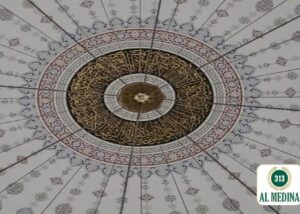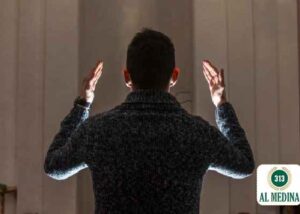Quran
Hadith
Islamic Text
Allah Most High is greater than His creation and He does not reside within it. Neither do the concepts of place, direction or occupying space apply to Allah (Most High). Therefore, ‘where’ does not apply to Allah (Most High).
لَيْسَ كَمِثْلِهِ شَيْءٌ وَهُوَ السَّمِيعُ الْبَصِيرُ
“There is nothing similar to Him, and He is the all-hearing and the all-seeing.” (Surah al-Shura: 11).
Some people prefer to answer the question, by quoting specific verses or Hadith narrations. Such narrations ostensibly attribute a place to Allah (Most High). However, these verses must be understood in light of Quranic verses that negate similitude between Allah (Most High) and his creation.
وَلَمْ يَكُنْ لَهُ كُفُوًا أَحَدٌ
“And there is no one similar to Him.” (Surah al-Ikhlaas: 11).
It is due to Quranic verses like the ones above that many scholars preferred to simply negate place for Allah (Most High).
وَتَعَالَى عَنِ الْحُدُودِ وَالْغَايَاتِ وَالْأَرْكَانِ وَالْأَعْضَاءِ وَالْأَدَوَاتِ لا تحويه الجهات الست كسائر المبتدعات. (العقيدة الطحاوية)
And He Most High is exalted above limitations, boundaries, supports, body parts and tools. He is not contained within the six directions unlike the entirety of creation. (Imam Abu Ja’far al-Tahaawi, al-Aqeedah al-Tahawiyyah).
فَإِنْ قَالَ اللَّهُ فِي السَّمَاءِ فَإِنْ قَصَدَ حِكَايَةَ مَا جَاءَ فِي ظَاهِرِ الْأَخْبَارِ لَا يَكْفُرُ وَإِنْ أَرَادَ الْمَكَانَ كَفَرَ وَإِنْ لَمْ يَكُنْ لَهُ نِيَّةٌ كَفَرَ عِنْدَ الْأَكْثَرِ وَهُوَ الْأَصَحُّ وَعَلَيْهِ الْفَتْوَى
If he (an individual) says Allah (Most High) is in the heavens, then if he intends to convey what has been mentioned in the reports, it is not Kufr. However, if he (the individual) intended a (physical) place, it is Kufr. If he had no intention, then it is Kufr [in accordance] with the majority. This is the sounder opinion and Fatwa is given according to it. (Imam Ibn Abideen, Radd al-Muhtaar).
الرَّحْمَنُ عَلَى الْعَرْشِ اسْتَوَى
“The Most Merciful is established upon the throne.” (Surah Ta-Ha, 5).
أَمْ أَمِنْتُمْ مَنْ فِي السَّمَاءِ أَنْ يُرْسِلَ عَلَيْكُمْ حَاصِبًا
“Do you feel secure that the One in Heaven will (not) send against you a storm of stones.” (Surah Mulk, 17).
عَنْ أَبِي هُرَيْرَةَ رَضِيَ اللَّهُ عَنْهُ: أَنَّ رَسُولَ اللَّهِ صَلَّى اللهُ عَلَيْهِ وَسَلَّمَ قَالَ: يَنْزِلُ رَبُّنَا تَبَارَكَ وَتَعَالَى كُلَّ لَيْلَةٍ إِلَى السَّمَاءِ الدُّنْيَا حِينَ يَبْقَى ثُلُثُ اللَّيْلِ الآخِرُ يَقُولُ: مَنْ يَدْعُونِي، فَأَسْتَجِيبَ لَهُ مَنْ يَسْأَلُنِي فَأُعْطِيَهُ، مَنْ يَسْتَغْفِرُنِي فَأَغْفِرَ لَهُ
Abu Hurairah (May Allah Most High be pleased with him) narrated that the Messenger of Allah ﷺ said, “‘Our Lord, the Blessed, the Exalted, descends to the nearest Heaven every night, when the last third of the night remains. He (Most High) says, ‘Who is supplicating to Me? That I may answer his prayer. Who is asking me? That I may grant him (his request). Who is seeking My forgiveness? That I may forgive him.’” (Sahih al-Bukhari, 1145).
فَقَالَ لَهَا: أَيْنَ اللهُ؟ قَالَتْ: فِي السَّمَاءِ، قَالَ: مَنْ أَنَا؟ قَالَتْ: أَنْتَ رَسُولُ اللهِ، قَالَ: أَعْتِقْهَا، فَإِنَّهَا مُؤْمِنَةٌ
The Messenger of Allah ﷺ said to her (a slave girl), “‘Where is Allah?’ She said, ‘In the heavens.’ He ﷺ said, ‘Who am I?’ She said, ‘You are the Messenger of Allah.’ He ﷺ said, ‘Free her, she is a believer.’” (Sahih Muslim, 537 – 33).
It is obvious that these Quranic verses and Hadith narrations are not to be taken literally because that would lead to a contradiction. Furthermore, contradiction in the genuine revelation of Allah (Most High) is impossible. For example, some will quote the verse above saying Allah Most High is in the Heavens. However, we also have the verse stating Allah Most High is established upon the throne. Thus, taking a literal approach to the verses is not permitted as it would imply a contradiction.
If we look at the Hadith stating that Allah (Most High) is in the lowest Heaven in the last third of the night, then that would also lead to contradiction if taken literally. It is always the last third of the night in some place on the face of the Earth. Therefore, Allah (Most High) would be in the lowest heaven all the time. So what would people of such literal understanding then say about the verses stating Allah (Most High) is established upon the throne, or in heaven generally?
Due to these contradictions, it is best to explain such Quranic verses and Hadith narrations as metaphorical. This protects people from falling into the catastrophic error of believing Allah (Most High) is in any manner similar to his creation. It also provides a clear resolution to the issue highlighted above. That is why so many classical scholars of Islam took this approach.
Some Muslims have the approach of simply quoting the Quranic verses and Hadith narrations above and going no further. Although this approach may be commendable in certain circumstances, it is usually better to explain the metaphorical meaning contained within the Quranic verses and Prophetic narrations. This is especially when addressing an audience that is not well acquainted with the details of Muslim creed (Aqeedah).
And Allah Most High Knows Best.
-Answered by Shaykh Noorud-deen Rashid (01.11.2022)
See also:
Salaf never interpreted verses of the Holy Quran describing Allah?
Did scholars from Salaf interpret the verse about the Eyes of Allah?
See also (video):






